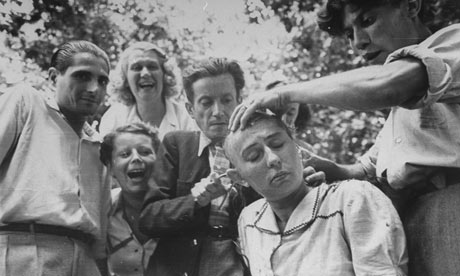I was drawn to Marguerite for many reasons:
- As Ruthie Henshall went to my school (long before me of course!), we were inculcated into following her career from a young age, so I couldn't miss such a vehicle for her.
- Julian Ovenden, as Marguerite's love interest Armand, has, in my opinion, the best voice on the West End stage.
- It's written by Alain Boublil and Claude-Michel Schönberg, the incredibly talented team behind Les Misérables, Miss Saigon and Martin Guerre, all of which I absolutely love.
On one level, Marguerite is another version of Alexandre Dumas' La Dame aux camélias, a story retold again and again, from La Traviata to Moulin Rouge: a courtesan falls for a romantic young man who gives her a second chance for love and freedom, but must give him up to save his life, and a tragic ending ensues. But a Boublil and Schönberg musical is never just a romance, and just as Miss Saigon brought aspects of the Vietnam war that had been swept under the carpet to the stage, so Marguerite does not shy away from perhaps the most difficult part of French history.
The musical starts in 1940. Marguerite is French and her keeper, Otto, a leader of the German occupation. Their relationship mirrors that of France and Germany: "Great Germany, supreme in power, and France in beauty, side by side". At the same time Marguerite's naive, frivolous relationship with her young suitor Armand juxtaposes the plight of Armand's sister Annette and her Jewish fiancé Lucien, who must live in constant fear as the French are going well beyond the demands of the Nazi occupiers in rounding up, deporting and torturing Jews.
Marguerite certainly doesn't pull any punches when it comes to the portrayal of the French bourgeoisie. Sure of Germany's eventual victory, they are shown profiteering, handing over Jews, and praising the German's for 'cleaning up France'. Then as soon as it's clear the Allies are going to win, they happily change sides and start searching for scapegoats. Having only ever learnt about the brave, French Resistance before, it was fascinating to see how people exploited the myth of Resistance for their own self preservation (of course lots of people did genuinely resist, but the real numbers are tiny compared to those who say they did).
Perhaps most shocking is the way Marguerite was treated. While she herself actually helps the resistance, she is an obvious target, a visible 'traitor' as everyone has seen her with a German man. She is subjected to a public humiliation and head-shaving to forever mark her as a collaborator, a practice sadly common at a time when everyone was trying to prove their innocence by piling blame onto an easy target.
Musicals are too often dismissed as light and fluffy - and some of them most certainly are - but Marguerite is undoubtedly a musical for grown-ups. Beyond the wonderful music and story-telling that Boublil and Schönberg are famous for, Marguerite is a fascinating insight into a period that too many people would rather ignore.


No comments:
Post a Comment